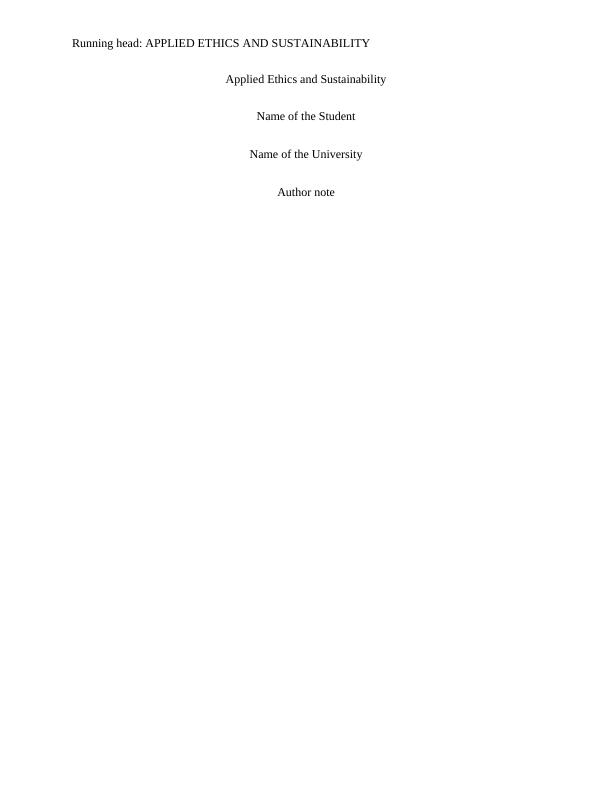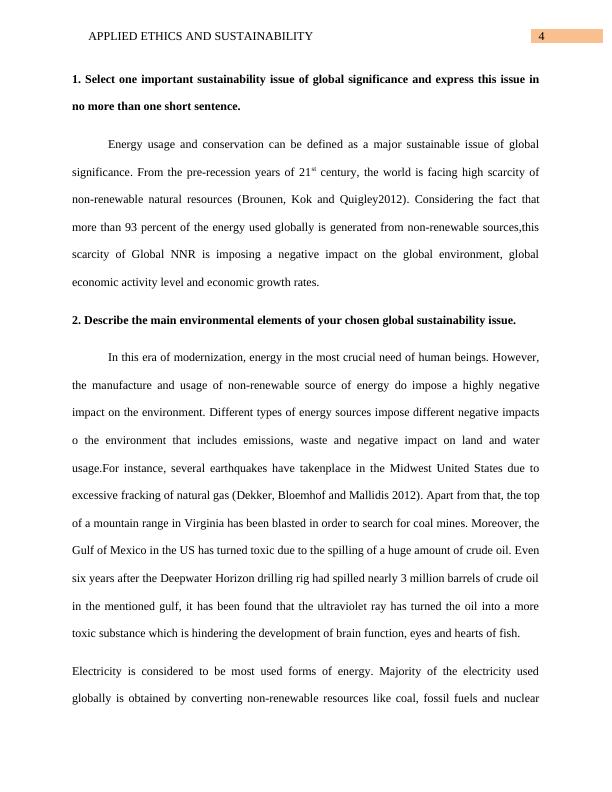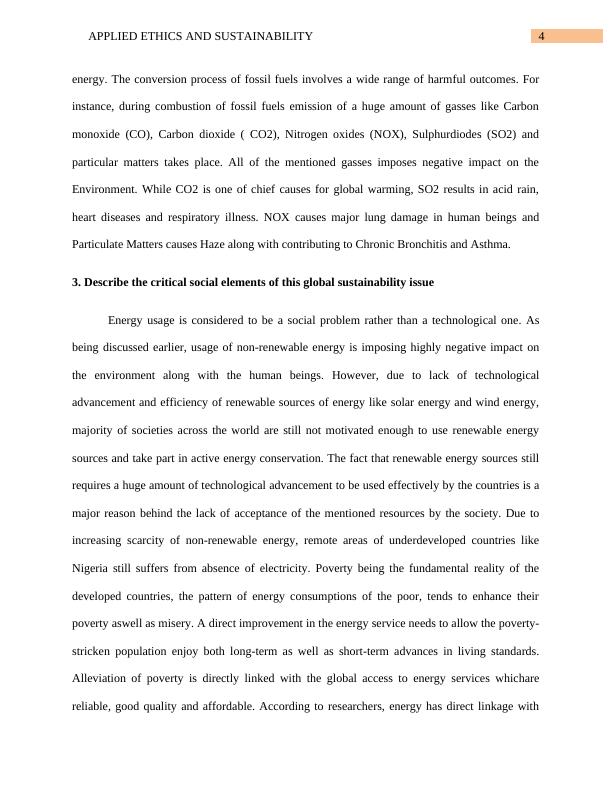Applied Ethics and Sustainability: Critical Analysis of Energy Usage and Conservation
Added on 2023-06-11
10 Pages2800 Words187 Views
Running head: APPLIED ETHICS AND SUSTAINABILITY
Applied Ethics and Sustainability
Name of the Student
Name of the University
Author note
Applied Ethics and Sustainability
Name of the Student
Name of the University
Author note

4APPLIED ETHICS AND SUSTAINABILITY
1. Select one important sustainability issue of global significance and express this issue in
no more than one short sentence.
Energy usage and conservation can be defined as a major sustainable issue of global
significance. From the pre-recession years of 21st century, the world is facing high scarcity of
non-renewable natural resources (Brounen, Kok and Quigley2012). Considering the fact that
more than 93 percent of the energy used globally is generated from non-renewable sources,this
scarcity of Global NNR is imposing a negative impact on the global environment, global
economic activity level and economic growth rates.
2. Describe the main environmental elements of your chosen global sustainability issue.
In this era of modernization, energy in the most crucial need of human beings. However,
the manufacture and usage of non-renewable source of energy do impose a highly negative
impact on the environment. Different types of energy sources impose different negative impacts
o the environment that includes emissions, waste and negative impact on land and water
usage.For instance, several earthquakes have takenplace in the Midwest United States due to
excessive fracking of natural gas (Dekker, Bloemhof and Mallidis 2012). Apart from that, the top
of a mountain range in Virginia has been blasted in order to search for coal mines. Moreover, the
Gulf of Mexico in the US has turned toxic due to the spilling of a huge amount of crude oil. Even
six years after the Deepwater Horizon drilling rig had spilled nearly 3 million barrels of crude oil
in the mentioned gulf, it has been found that the ultraviolet ray has turned the oil into a more
toxic substance which is hindering the development of brain function, eyes and hearts of fish.
Electricity is considered to be most used forms of energy. Majority of the electricity used
globally is obtained by converting non-renewable resources like coal, fossil fuels and nuclear
1. Select one important sustainability issue of global significance and express this issue in
no more than one short sentence.
Energy usage and conservation can be defined as a major sustainable issue of global
significance. From the pre-recession years of 21st century, the world is facing high scarcity of
non-renewable natural resources (Brounen, Kok and Quigley2012). Considering the fact that
more than 93 percent of the energy used globally is generated from non-renewable sources,this
scarcity of Global NNR is imposing a negative impact on the global environment, global
economic activity level and economic growth rates.
2. Describe the main environmental elements of your chosen global sustainability issue.
In this era of modernization, energy in the most crucial need of human beings. However,
the manufacture and usage of non-renewable source of energy do impose a highly negative
impact on the environment. Different types of energy sources impose different negative impacts
o the environment that includes emissions, waste and negative impact on land and water
usage.For instance, several earthquakes have takenplace in the Midwest United States due to
excessive fracking of natural gas (Dekker, Bloemhof and Mallidis 2012). Apart from that, the top
of a mountain range in Virginia has been blasted in order to search for coal mines. Moreover, the
Gulf of Mexico in the US has turned toxic due to the spilling of a huge amount of crude oil. Even
six years after the Deepwater Horizon drilling rig had spilled nearly 3 million barrels of crude oil
in the mentioned gulf, it has been found that the ultraviolet ray has turned the oil into a more
toxic substance which is hindering the development of brain function, eyes and hearts of fish.
Electricity is considered to be most used forms of energy. Majority of the electricity used
globally is obtained by converting non-renewable resources like coal, fossil fuels and nuclear

4APPLIED ETHICS AND SUSTAINABILITY
energy. The conversion process of fossil fuels involves a wide range of harmful outcomes. For
instance, during combustion of fossil fuels emission of a huge amount of gasses like Carbon
monoxide (CO), Carbon dioxide ( CO2), Nitrogen oxides (NOX), Sulphurdiodes (SO2) and
particular matters takes place. All of the mentioned gasses imposes negative impact on the
Environment. While CO2 is one of chief causes for global warming, SO2 results in acid rain,
heart diseases and respiratory illness. NOX causes major lung damage in human beings and
Particulate Matters causes Haze along with contributing to Chronic Bronchitis and Asthma.
3. Describe the critical social elements of this global sustainability issue
Energy usage is considered to be a social problem rather than a technological one. As
being discussed earlier, usage of non-renewable energy is imposing highly negative impact on
the environment along with the human beings. However, due to lack of technological
advancement and efficiency of renewable sources of energy like solar energy and wind energy,
majority of societies across the world are still not motivated enough to use renewable energy
sources and take part in active energy conservation. The fact that renewable energy sources still
requires a huge amount of technological advancement to be used effectively by the countries is a
major reason behind the lack of acceptance of the mentioned resources by the society. Due to
increasing scarcity of non-renewable energy, remote areas of underdeveloped countries like
Nigeria still suffers from absence of electricity. Poverty being the fundamental reality of the
developed countries, the pattern of energy consumptions of the poor, tends to enhance their
poverty aswell as misery. A direct improvement in the energy service needs to allow the poverty-
stricken population enjoy both long-term as well as short-term advances in living standards.
Alleviation of poverty is directly linked with the global access to energy services whichare
reliable, good quality and affordable. According to researchers, energy has direct linkage with
energy. The conversion process of fossil fuels involves a wide range of harmful outcomes. For
instance, during combustion of fossil fuels emission of a huge amount of gasses like Carbon
monoxide (CO), Carbon dioxide ( CO2), Nitrogen oxides (NOX), Sulphurdiodes (SO2) and
particular matters takes place. All of the mentioned gasses imposes negative impact on the
Environment. While CO2 is one of chief causes for global warming, SO2 results in acid rain,
heart diseases and respiratory illness. NOX causes major lung damage in human beings and
Particulate Matters causes Haze along with contributing to Chronic Bronchitis and Asthma.
3. Describe the critical social elements of this global sustainability issue
Energy usage is considered to be a social problem rather than a technological one. As
being discussed earlier, usage of non-renewable energy is imposing highly negative impact on
the environment along with the human beings. However, due to lack of technological
advancement and efficiency of renewable sources of energy like solar energy and wind energy,
majority of societies across the world are still not motivated enough to use renewable energy
sources and take part in active energy conservation. The fact that renewable energy sources still
requires a huge amount of technological advancement to be used effectively by the countries is a
major reason behind the lack of acceptance of the mentioned resources by the society. Due to
increasing scarcity of non-renewable energy, remote areas of underdeveloped countries like
Nigeria still suffers from absence of electricity. Poverty being the fundamental reality of the
developed countries, the pattern of energy consumptions of the poor, tends to enhance their
poverty aswell as misery. A direct improvement in the energy service needs to allow the poverty-
stricken population enjoy both long-term as well as short-term advances in living standards.
Alleviation of poverty is directly linked with the global access to energy services whichare
reliable, good quality and affordable. According to researchers, energy has direct linkage with

End of preview
Want to access all the pages? Upload your documents or become a member.
Related Documents
Unit 44 - Industrial Power, Electronics and Storagelg...
|9
|3716
|62
Impact of Cement Industry on Environmentlg...
|15
|3908
|84
Use of Solar Energy and Its Impact on the Environment Systemlg...
|8
|2314
|63
Nuclear energy in malaysia PDFlg...
|9
|1493
|56
Switching from Fossil Fuels to Renewable Energy Sources Research 2022lg...
|9
|3005
|10
Dependency on Nuclear Power as a Sustainable Energy Sourcelg...
|7
|1828
|363